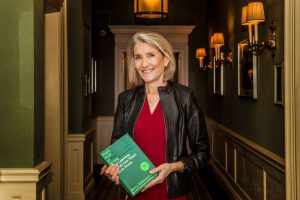Ahead of HPC’s sponsorship of the L&DI’s National Learning & Development Conference, the Sunday Times’ article on “Future-Proofing Growth: Ireland’s L&D leaders tackle AI, automation and skills transformation” explores the themes that will be at the heart of this key event on 19 November at Croke Park.
Artificial intelligence is rewriting the rules of work. Machines can think faster and learn quicker, but they can’t imagine, empathise, or inspire. To stay ahead, people need to grow just as fast as the technology that surrounds them.
Enter the National Learning & Development Conference 2025, at which Ireland’s top learning minds will tackle how to future-proof human potential. The conference brings together Ireland’s leading professionals in the learning arena to explore the theme: “Future-Proofing Growth: Skills and Human Potential.” The event is designed to help learning leaders build resilient, future-ready workforces, focusing on the skills, mindsets, and cultures required to thrive in an era that is dominated by automation, artificial intelligence, and constant change.
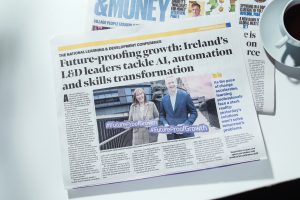
The conference promises a full day of immersive learning experiences. Delegates will hear from high-profile keynote speakers and participate in interactive workshops designed to provide practical tools to strengthen organisational learning capability. Panels will tackle pressing topics including the integration of AI into training, skills transformation, and leadership in uncertain times. Networking opportunities throughout the day will allow professionals from across industries to share ideas, collaborate, and learn from one another.
This year’s keynote speakers include Daniel Susskind, bestselling author and economist, who will explore the future of work in the age of AI, drawing on his bestselling books, ‘The Future of the Professions’ and ‘A World Without Work.’
He will highlight advances in AI, with new systems, from ChatGPT to DALL-E. What does all this progress mean for the future of work? It is one of the greatest questions of our time.
Tom Kelley, bestselling author of ‘Creative Confidence’ and IDEO leader, will share strategies to help learning teams lead with imagination, empathy, and courage. Along the way, he’ll offer a fresh perspective on mentorship and tools for staying future-ready, with a focus on how to strengthen human-centred leadership in the age of AI.
Speaking ahead of the event, Kevin Hannigan, CEO at HPC, highlighted the importance of collaboration and adaptability.
“As the pace of change accelerates, learning professionals face a stark reality: yesterday’s solutions won’t solve tomorrow’s problems,” he said.
“The rise of AI, shifting workforce expectations, and relentless disruption demand that we rethink everything, including how we build skills, ignite human potential and create agile mindsets. At HPC, we’re proud to sponsor this conference because real progress comes from sharing big ideas in a collaborative environment. We look forward to joining fellow learning professionals from across the country to spark new thinking and equip our organisations to shape what comes next.”
Whether you are a seasoned learning professional, a business leader, or emerging talent, the L&DI National Conference 2025 is designed to equip delegates with the knowledge, skills, and inspiration needed to future-proof their organisations.
L&DI & HPC Contributors
Sinéad Heneghan – L&DI

As CEO of the L&DI, Sinéad leads the Institute’s strategic development work and oversees research and engagement with members. This informs the ongoing development of the member offer and continuous professional development opportunities for practitioners.
She has vast experience with Individuals, Corporates, Further and Higher Education Providers and State Agencies and has represented the industry in an influencing and Advocacy role for many years.
She holds an MBA from DCU, MSc in Leadership & Change Management, a BA in Local and Community Development from Maynooth University and a Certificate in Training & Development.
Connect with Sinead on LinkedIn >>>
Connect with L&DI on LinkedIn >>>
Kevin Hannigan – HPC
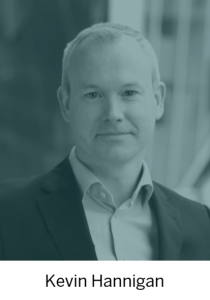
Kevin is HPC’s CEO. He works with clients to develop, deliver and evaluate bespoke solutions that drive performance across their business.
He is a highly skilled consultant and facilitator with a wealth of experience in designing the systems and processes that support effective learning, measurement and talent development.
Before joining HPC in 2013, Kevin was head of learning and development for Matheson, Ireland’s largest law firm and for C&C Ireland.
kevin.hannigan@wearehpc.com
Connect with Kevin on LinkedIn >>>
Connect with HPC on LinkedIn >>>

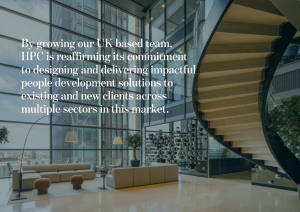 We will also be working more regularly from our new London base in Heron Tower, Bishopsgate. Located on the northeastern corner of the financial hub of the City, its central location allows us to connect with existing and new clients.
We will also be working more regularly from our new London base in Heron Tower, Bishopsgate. Located on the northeastern corner of the financial hub of the City, its central location allows us to connect with existing and new clients.
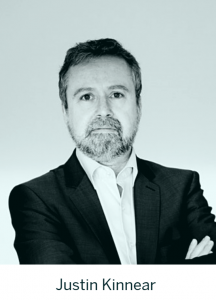
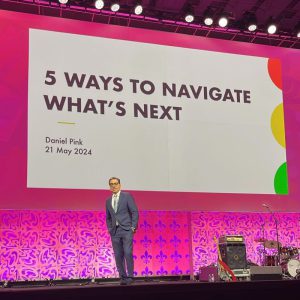
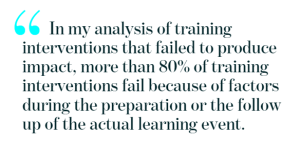 Kevin then asked Robert about what drives learning transfer. In Robert’s view, many factors drive learning transfer, some of which happen before the learning takes place, and some of which take place after the learning. In Robert’s experience, about 80% of the impact of learning depends on these before and after elements. Some specific considerations that Robert highlighted are:
Kevin then asked Robert about what drives learning transfer. In Robert’s view, many factors drive learning transfer, some of which happen before the learning takes place, and some of which take place after the learning. In Robert’s experience, about 80% of the impact of learning depends on these before and after elements. Some specific considerations that Robert highlighted are: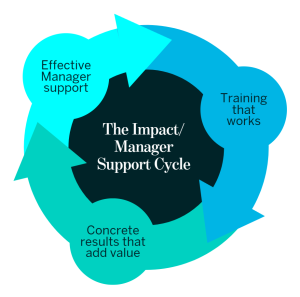 Kevin noted how these elements suggest that the involvement and support of the learner’s line manager is key, and probed Robert a little more on this. Robert emphasised that the manager is key to the learner developing a sense of accountability for applying their learning and that this, in turn, depends on there being a dialogue with the manager before and after the learning. Robert noted how often “most people are held accountable for participating” but that this is not enough for learning to deliver real and consequential value to the organisation.
Kevin noted how these elements suggest that the involvement and support of the learner’s line manager is key, and probed Robert a little more on this. Robert emphasised that the manager is key to the learner developing a sense of accountability for applying their learning and that this, in turn, depends on there being a dialogue with the manager before and after the learning. Robert noted how often “most people are held accountable for participating” but that this is not enough for learning to deliver real and consequential value to the organisation.
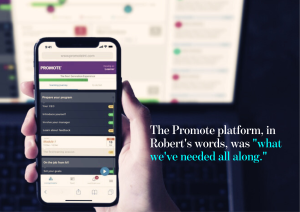 The final part of the discussion explored the value of the Promote platform. HPC uses Promote to facilitate learning transfer for clients and to create a compelling blended experience for programme participants. Since starting to use the platform in 2016, it has supported thousands of learners to continue their learning journey beyond the “classroom”. Kevin first came across the Promote platform when reading a report that Robert had joined the company as an advisor and he was curious as to how Robert had become involved. Robert first encountered the platform after he had retired, noting that for most of his career training was event-focused. Robert knew of the importance of the before and after factors that wrap around a training event, as well as the reliance on managers, all of which was hard to do. The Promote platform, in Robert’s words, was “what we’ve needed all along! When I saw it, I came off the retirement bench to get involved as much as I could in this promising technology!” The platform allows you to manage the before and after factors, giving you control and allowing you to connect with your learners in their workplace. Equally, there is no place to hide for a learner anymore because we can see it and do something about it. With Promote, learners are accountable for doing something useful with their learning.
The final part of the discussion explored the value of the Promote platform. HPC uses Promote to facilitate learning transfer for clients and to create a compelling blended experience for programme participants. Since starting to use the platform in 2016, it has supported thousands of learners to continue their learning journey beyond the “classroom”. Kevin first came across the Promote platform when reading a report that Robert had joined the company as an advisor and he was curious as to how Robert had become involved. Robert first encountered the platform after he had retired, noting that for most of his career training was event-focused. Robert knew of the importance of the before and after factors that wrap around a training event, as well as the reliance on managers, all of which was hard to do. The Promote platform, in Robert’s words, was “what we’ve needed all along! When I saw it, I came off the retirement bench to get involved as much as I could in this promising technology!” The platform allows you to manage the before and after factors, giving you control and allowing you to connect with your learners in their workplace. Equally, there is no place to hide for a learner anymore because we can see it and do something about it. With Promote, learners are accountable for doing something useful with their learning.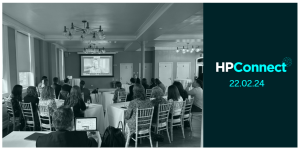 As Kevin and Robert wrapped up their conversation, Robert graciously took two questions from the audience. The first question to Robert was “if he felt that L&D professionals needed to become more sales and marketing-focused to sell the benefits of learning solutions to a business.” Robert emphasised the importance of L&D professionals using data to provide evidence that training pays off, and even to show when learning is not being fully utilised and how a business could get more from it. He used the term “User education” to remind us that learning doesn’t just work magically and that you need to do something with the learning to get value from it. Being able to show a manager what is working, and where there is value not being fully exploited is very impactful. He spoke about a shift in the “user” mindset about learning. Learning is no longer about filling seats but instead is concerned with making sure L&D provides value to our clients. He ended this response by urging L&D professionals to “market the bejesus out of learning to clients”.
As Kevin and Robert wrapped up their conversation, Robert graciously took two questions from the audience. The first question to Robert was “if he felt that L&D professionals needed to become more sales and marketing-focused to sell the benefits of learning solutions to a business.” Robert emphasised the importance of L&D professionals using data to provide evidence that training pays off, and even to show when learning is not being fully utilised and how a business could get more from it. He used the term “User education” to remind us that learning doesn’t just work magically and that you need to do something with the learning to get value from it. Being able to show a manager what is working, and where there is value not being fully exploited is very impactful. He spoke about a shift in the “user” mindset about learning. Learning is no longer about filling seats but instead is concerned with making sure L&D provides value to our clients. He ended this response by urging L&D professionals to “market the bejesus out of learning to clients”.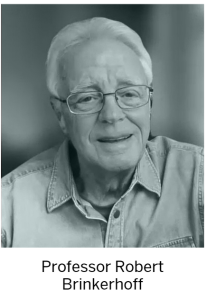

 When Bob Dylan released “The Times They Are A-Changin’” in 1964 it no doubt resonated with people who could see change happening all around them. History since then has taught us that every generation feels like this. Things are changing faster than ever before, and while we would like to stop all the change for a little while to draw breath, this simply isn’t going to be possible. So, as we face ever faster and more dramatic changes in our lives at work and home, we need to revisit our personal beliefs about change. While a yearning for stability and predictability is very human, not least because it tries to preserve scarce decisional resources, your brain is perfectly capable of learning, evolving, presenting you with decision options, and weighing risk. We can’t expect the level of change to lessen, so we must embrace the need for continuous change and personal evolution.
When Bob Dylan released “The Times They Are A-Changin’” in 1964 it no doubt resonated with people who could see change happening all around them. History since then has taught us that every generation feels like this. Things are changing faster than ever before, and while we would like to stop all the change for a little while to draw breath, this simply isn’t going to be possible. So, as we face ever faster and more dramatic changes in our lives at work and home, we need to revisit our personal beliefs about change. While a yearning for stability and predictability is very human, not least because it tries to preserve scarce decisional resources, your brain is perfectly capable of learning, evolving, presenting you with decision options, and weighing risk. We can’t expect the level of change to lessen, so we must embrace the need for continuous change and personal evolution.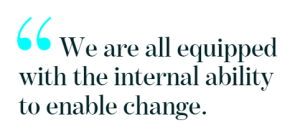 We might not all feel the same way about an upcoming change. We may not all relish the challenge of crisis or discontinuity. We can all cope with these challenges, but only by letting go of the worn-out belief that we can’t change. Our brains are designed to adapt, but our minds often try to avoid the work. In a world where more change is certain, embrace your own in-built capability to learn, try, fail, and ultimately change.
We might not all feel the same way about an upcoming change. We may not all relish the challenge of crisis or discontinuity. We can all cope with these challenges, but only by letting go of the worn-out belief that we can’t change. Our brains are designed to adapt, but our minds often try to avoid the work. In a world where more change is certain, embrace your own in-built capability to learn, try, fail, and ultimately change.
